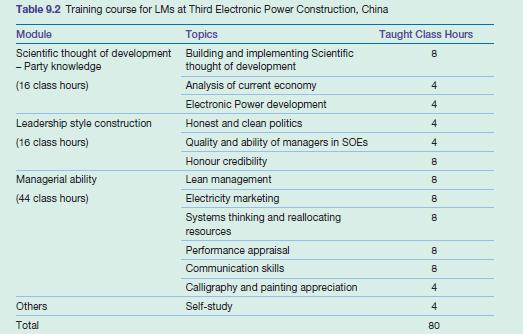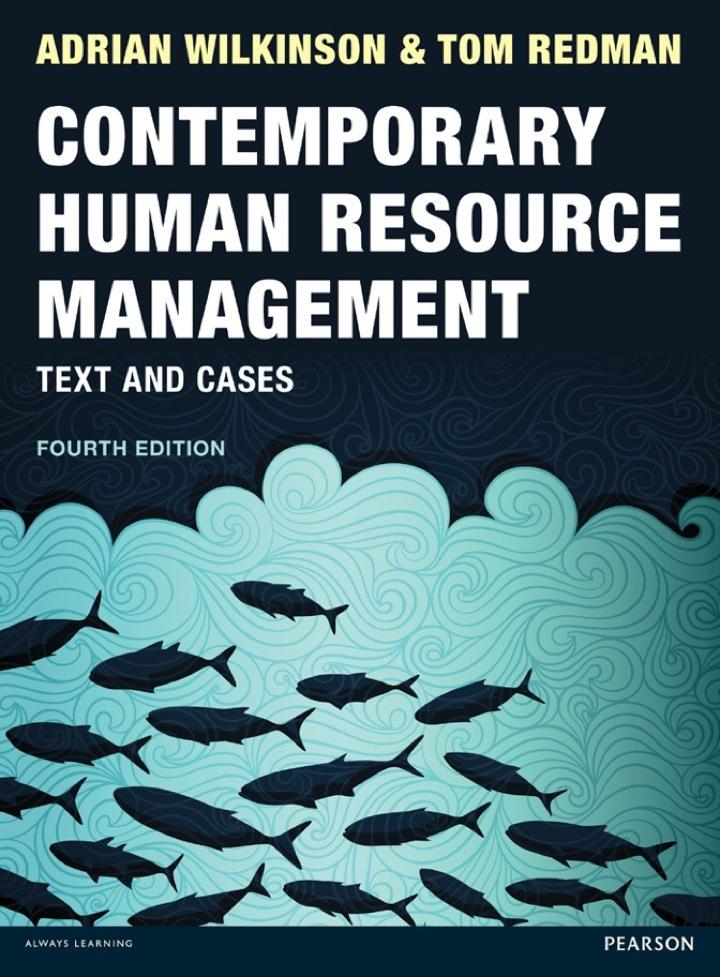This case concerns a state-owned enterprise (SOE), the Third Electronic Power Construction Company located in Shan Xi
Question:
This case concerns a state-owned enterprise (SOE), the Third Electronic Power Construction Company located in Shan Xi Province, China. This SOE was established in 1978, and is responsible for building thermal power plants across China focusing on quality construction.
The Head Office of Third Electronic is based Shan Xi’s capital, Tai Yuan, where 707 employees work, and their 12 subsidiaries of this SOE are distributed among other Chinese provinces, employing nearly 2,000 staff.
Increased competition from other Chinese SOEs, private companies and less government financial support are impacting on the operations of Third Electronic –
who are responding to them by recruiting and developing technical experts and graduates. However, a key problem they face is with their existing Line Managers
(LMs), who tend to be: older workers (mainly aged 46–55); whom have a lower than average educational level (up to Advanced Diploma level only); and who are not used to operating with Western concepts such as management development and HRM more generally.
So, key challenges for Third Electronic lie in developing their existing LMs to meet competitive and financial pressures, and to recruit excellent new LMs to ensure managerial succession over time. To meet these HRM based challenges, this SOE has produced an off-the job management training course for LMs which includes some HRM-related elements, such as performance appraisal and communication skills. The module outline for this training course is detailed in Table 9.2.
The training programme lasts 11 days and contains some 80 hours of taught classes. What follows below are HR and LM views of this training course. Such managerial opinions are derived from data collected using semi-structured interviews with (all) 19 LMs working at Head Office in Third Electronic Power (China) in 2011.
Among the potential LM participants of the training course above, only four attended it, and such non-attendance figures contrast with findings from Yang (2003) of a 64 per cent attendance among managers in on-the-job training at other Chinese SOEs.
When probed as to why this low take-up of training exists, the LMs interviewed state that the absent LMs want to ‘go abroad’ for such training instead, and/or are ‘too busy’ to attend this training course.
One senior manager at Third Electronic comments that the organization do not generally provide enough training for LMs because ‘the company care more about profit’ than training, while another argues that this is not a problem, as such LMs can learn the practical skills they need ‘on-the-job’, or by themselves ‘after work’.
Barriers to implementing LM training
LMs at Third Electronic identified a number of barriers to enacting LM training there. Initially, a lack of HR autonomy was seen, in terms of HR’s ability to establish and deliver training programmers for LMs. Here, one HR manager argues that:
All we can do is what the top manager wants. We cannot say ‘no’ to the training project, despite sometimes knowing that the training content is worthless.
Most SOEs in China are like this. Additionally, when we designed the training proposal, the content, budget, time and place all need both manager and Party Committee approval. We can only implement the training after they all agree it.
Additionally, little training budget seems to exist for the HR department to fund such LM training. Here, another HR manager states that:
The budget is too tight to invite outside training experts to come in, and it is not possible to implement training outside the organization. Even if we have authority to do so, we cannot afford it.

Such a situation may perhaps seem odd to some observers of HRM in China, as the Chinese Vocational Education Law (of 1996) states that the lowest training investment for any worker is 1.5 per cent of individual total salary (Xie and Wu, 2001). Clearly, this ‘law’ is one that Chinese SOEs such as Third Electronic do not seem to rely on. However, other seasoned commentators in HRM may also note differences here between espoused HRM in theory, and enacted HRM in practice (as per Legge, 1995).
The LMs interviewed all also acknowledged that LM motivation plays a crucial role in the success of training processes. Here, one LM comments that:
I treasure training opportunities, as they could provide me with new knowledge and skills that I did not have before. It is really amazing for me, as my communication skills are improved through training, and now I have a rough knowledge about performance appraisal too.
However, a different LM added:
I do not value training. If training is designed better to cater for our daily work, it may be worthwhile to consider attending such training courses.
A lack of autonomy in choosing a training programme was also highlighted by LMs. Here, one LM argues that:
Usually I have no choice but to attend training, and HR would inform me in advance that I need to do so.
I do not like being forced to attend, because I think sometimes the training is not suitable for me. I hope I can determine whether to attend by myself, however I do not think this can be realised in a hierarchy like an SOE.
This comment supports Yang’s (2003) findings that some LMs in Chinese SOEs seem to have appreciably higher work motivation if they have the opportunity to determine their training participation.
In line with findings from Tsai and Tai (2003), all of the LMs interviewed mentioned top management commitment as an important driver of more positive LM attitudes to training, as:
If a senior manager said this training is worth attending, or something encouraging about it to me, then I am happy to go to it.
However, some other LMs had different, contrasting views about such top management support. On the one hand, one LM states that: I think my top manager usually supports me. Because our company is an electronic power construction company, they focus more on safety. I have attended safety training twice this year.
While on the other, another LM comments that:
Top managers seldom support me. When I compiled the construction business plan for this year, he would not agree to give me the training I needed.
Further, LMs also mentioned training outcome expectancy as a factor which influences their attitude towards training. Here, one LM argues that:
I am very busy in my daily work, so if I take part in training, this is an opportunity not only to improve my knowledge level, but also to develop my career and may even lead to pay rise.
Or put more simply:
I think training is instrumental to career development, especially the political courses. For anyone who wants promotion, such courses are necessary to attend.
A final issue that LMs raised concerned the relevance of the topics they were taught. Here, regarding the modules on Party news, and knowledge and leadership style construction, one LM states that:
Every time in training it is essential to learn political knowledge. I know it may be important, but it cannot help improve my work. Also after this training, they test what you learnt about political knowledge, and we have to recite it after work as well. It is too hard to memories.
Here, taught courses at Third Electronic seem more relevant to some LMs than to others!
While most ‘cadres’ in this Chinese SOE are Communist Party members, Party knowledge thus appears in organizational training, but some LMs at Third Electronic China also report that such political training may not always be seen as applicable to their daily work as LMs. Lastly here, and related to training relevance, it is also difficult to see (at least through arguably biased Western eyes) how training LMs in calligraphy and painting appreciation are relevant to LM work, or how they could be so in future.
Question
1 What do you think Chinese organizations such as those in the case above can generally learn from the relevant literature on involving LMs in HRM?
2 Do you think that a rapidly developing country such as China is ready, or prepared for, training LMs in general terms? What evidence or arguments would you use to support your case here?
3 Reflecting on the case findings above, to what extent do you think Chinese LMs rate HR as a ‘strategic partner’?
4 Do you think that Chinese LMs in the case above engage in either social face or conflict avoidance?
Step by Step Answer:

Contemporary Human Resource Management Text And Cases
ISBN: 9780273757825
4th Edition
Authors: Tom Redman, Adrian Wilkinson





